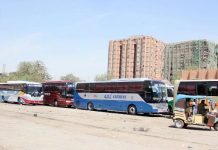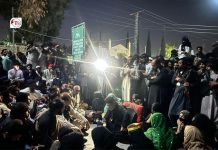Author: Zaarain Baloch
Pakistan is reeling from a severe economic crisis that shows no signs of alleviating any time soon. The centre is struggling to evade the looming economic meltdown, with little success so far. Fuel prices are skyrocketing and the concomitant rise in edibles and household items means the common man can barely afford to survive. Ishaq Dar, the so-called ‘economic wizard’ of the ruling PDM coalition, has failed to deliver on the hype – his abortive ‘Darpeg’ has sent the economy into a tailspin. The country’s forex reserves have plunged to an alarming $3.1 billion, barely enough to cover a month’s imports, and way below the global benchmark, which is three times higher. Islamabad and the IMF are at loggerheads over an economic bailout, and besides a few thorny issues, the two sides are expected to agree on raising fuel, electricity, and gas prices – plus introducing new taxes. For the common man, life in Pakistan is getting increasingly difficult. Balochistan is a particular victim of the crisis.
Balochistan’s financial crisis is worsening every day as it has not received its share of resources for the rehabilitation and reconstruction of infrastructure in flood-ravaged areas. Chief Minister Quddus Bizenjo and Finance Minister Zamrak Khan Piralizai have repeatedly drawn attention to this fact, but the centre has made no response so far. Balochistan Government Spokesperson Farah Azeem Shah said in a press conference a week ago that if the centre does not release Balochistan’s dues worth Rs75 billion, the government would not be able to pay salaries to its employees.
Last year’s floods rendered hundreds of thousands homeless in Balochistan as their houses and belongings were washed away. Twenty-eight of Balochistan’s thirty-five districts were ravaged by the floods; schools and hospitals were also shut down.
Pakistani premier Shehbaz Sharif announced a grant of Rs10 billion for the rehabilitation of the flood-ravaged areas, but Balochistan has not received a single dime of its share of the funds. The Balochistan government spokespersons have said that the government has had to spend “huge amounts” from its own resources to help the victims. The government coffers are being emptied – the economic resources are being stretched to the breaking point, and there is no help in sight.
Balochistan’s financial crisis is grimly manifesting itself in different areas, most notably in the education and the health sector. Owing to the lack of funds, publishers in Balochistan have halted the publishing and distribution of free books. The students in Balochistan’s government schools have received free course books and stationery for decades, but the ongoing financial crisis has now made this a distant possibility.
According to reports, the Revenue Department of Balochistan has failed to pay the Rs560 million it owes to the publishers, and the publishing and distribution of 86 million books have been put to a halt. The publishers have provided 25% of the books to the education department, but the remaining 75% have not been put to print. Balochistan Textbook Board Chairman Yahya Mengal has warned that if the government does not pay the dues to publishers, Balochistan’s education sector would face a massive blow and thousands of children might have to stop their education.
The Junior Teachers’ Alliance held a press conference in the Quetta Press Club where they lamented the fact that the Balochistan government frequently calls on teachers to serve on duties outside of their training and line of work. Balochistan’s schools already suffer from a crippling teacher shortage, and the government has now posted teachers to service duties in the national census. The teachers’ alliance said that over 3,000 schools have been closed due to a teachers’ shortage, and the teachers that are present are being overworked. They are expected to serve duties during the national elections and the census, which does not align with their training. Thousands of teachers are posted in far-flung regions, which only adds to their woes.
The health sector is also badly hit. The heavy monsoon rains washed away numerous hospitals and medical centres throughout Balochistan, at a time when the people need medical facilities the most. The government has failed to rehabilitate most of the hospitals. The city teaching hospital in Panjgoor is one of the many hospitals throughout Balcohsitan that face a shortage of medical staff and facilities. The locals in Panjgoor lament that doctors and other medical staff are rarely present at the hospital.
Deputy Commissioner Panjgoor Amjad Hussian Soomro visited the hospital on Tuesday where he was briefed on issues facing the hospital. He also stressed the importance of the city teaching hospital, saying that it serves the people of Panjgoor and its surrounding areas. Soomro said that he is aware of the situation in the hospital, and would do everything in his power to assist the administration in solving the issues.
In other areas of Balochistan, the situation is even worse. According to the All Balochistan Medical Stores Association, the prices of various medicines in the provincial capital Quetta have risen by 100%. In the black market, people are paying over 300% for drugs prescribed for patients going through dialysis and battling cancer. For example, Tegral, a popular drug for epilepsy, is originally worth Rs250 and is being sold for Rs700. Similarly, Heparin, an anticoagulant administered during dialysis to prevent blood clotting, is being sold for Rs1500, when it is originally worth Rs680.
Doctors’ associations and civil society have appealed to the government authorities to take notice of the rampant illegal drug trade in black markets but to no avail. There are also reports that numerous medicine suppliers and pharmaceutical companies are a part of this scheme – they halt the supply of certain medicines to engineer shortages so that they can sell them at higher prices in the black market. Though these reports are unsubstantiated, the possibility of that happening is anxiety-provoking.
Pakistan is going through one economic crisis after the other, and the people of Balochistan are its particular victims. The global development indexes and rights groups have labeled Balochistan as the most “underprivileged and underdeveloped province of Pakistan.” The recent floods have been catastrophic – thousands of families long for rehabilitation. The education and the health sectors, the two most important requirements of Balochistan, are plagued by a combination of negligence, corruption, and ineptitude. The federal government has failed to pay Balochistan’s due share of the resources for the past three months, and the coffers of the provincial government are being emptied at an alarming rate. The price hikes and the rising inflation have made life hellish for the people. It is essential that the people in power brainstorm a way of out this mess. Unlike Punjab, Balochistan cannot afford a crisis of such magnitude.






























